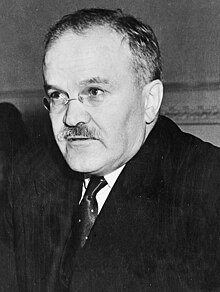
Back Wjatsjeslaf Molotof Afrikaans Vyacheslav Molotov AN فياتشيسلاف ميخائيلوفيتش مولوتوف Arabic فياتشيسلاف مولوتوف ARZ Viacheslav Mólotov AST Vyaçeslav Molotov Azerbaijani Молотов Вячеслав Михайлович Bashkir Вячаслаў Міхайлавіч Молатаў Byelorussian Вячаслаў Молатаў BE-X-OLD Вячеслав Молотов Bulgarian
Vyacheslav Molotov | |
|---|---|
Вячеслав Молотов | |
 Molotov in 1945 | |
| Chairman of the Council of People's Commissars of the Soviet Union | |
| In office 19 December 1930 – 6 May 1941 | |
| First Deputy | Valerian Kuybyshev Nikolai Voznesensky |
| Preceded by | Alexei Rykov |
| Succeeded by | Joseph Stalin |
| Minister of Foreign Affairs of the Soviet Union[a] | |
| In office 5 March 1953 – 1 June 1956 | |
| Premier | |
| Preceded by | Andrey Vyshinsky |
| Succeeded by | Dmitri Shepilov |
| In office 3 May 1939 – 4 March 1949 | |
| Premier | Himself (1939–1941) Joseph Stalin (1941–1949) |
| Preceded by | Maxim Litvinov |
| Succeeded by | Andrey Vyshinsky |
| First Deputy Chairman of the Council of Ministers of the Soviet Union[b] | |
| In office 16 August 1942 – 29 June 1957 | |
| Premier |
|
| Responsible Secretary of the Russian Communist Party (Bolsheviks) | |
| In office 16 March 1921 – 3 April 1922 | |
| Preceded by | Nikolay Krestinsky |
| Succeeded by | Joseph Stalin (as General Secretary) |
| Personal details | |
| Born | Vyacheslav Mikhaylovich Skryabin 9 March 1890 Kukarka, Russian Empire (present day Sovetsk, Kirov Oblast, Russia) |
| Died | 8 November 1986 (aged 96) Moscow, Soviet Union |
| Resting place | Novodevichy Cemetery, Moscow |
| Political party | |
| Spouse | |
| Relatives | Vyacheslav Nikonov (grandson) |
| Awards | Order of the Badge of Honour |
| Signature | |
Central institution membership
Other offices held
| |
Vyacheslav Mikhaylovich Molotov[c] (né Skryabin;[d] 9 March [O. S. 25 February] 1890 – 8 November 1986) was a Soviet politician, diplomat, and revolutionary who was a leading figure in the government of the Soviet Union from the 1920s to the 1950s, as one of Joseph Stalin's closest allies. Molotov served as Chairman of the Council of People's Commissars (head of government) from 1930 to 1941, and as Minister of Foreign Affairs from 1939 to 1949 during the era of the Second World War, and again from 1953 to 1956.
An Old Bolshevik, Molotov joined the Russian Social Democratic Labour Party in 1906 and was arrested and internally exiled twice before the October Revolution of 1917. He briefly headed the party's Secretariat before supporting Stalin's rise to power in the 1920s, becoming one of his closest associates. Molotov was made a full member of the Politburo in 1926 and became premier in 1930, overseeing Stalin's agricultural collectivization (and resulting famine) and his Great Purge. As foreign minister from 1939, Molotov signed the Molotov–Ribbentrop Pact with Nazi Germany, and during the Second World War was deputy chairman of the State Defense Committee and Stalin's main negotiator with the Allies. After the war, he began to lose favour, losing his ministership in 1948 before being criticized by Stalin at the 19th Party Congress in 1952.
Molotov was reappointed foreign minister after Stalin's death in 1953, but his staunch opposition to leader Nikita Khrushchev's de-Stalinization policy led him to join a failed coup against Khrushchev in 1957, after which he was dismissed from all of his positions. Molotov was sent to Mongolia as an ambassador before being expelled from the party in 1961. He continued to defend Stalin's legacy until his own death in 1986.
Cite error: There are <ref group=lower-alpha> tags or {{efn}} templates on this page, but the references will not show without a {{reflist|group=lower-alpha}} template or {{notelist}} template (see the help page).